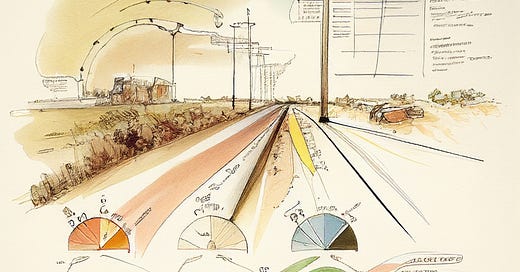What makes a good goal?
Most of us have heard of "SMART goals" (Specific, Measurable, Achievable, Relevant, and Time-Bound), but in my experience, SMART is only the tip of the iceberg. OKRs, to their benefit, seek to encourage some positive goal-setting habits, but ultimately they are still goals.
A good goal is an enabling constraint—simultaneously narrowing our focus AND encouraging good things to happen. It has guardrails to help limit downsides and promote upsides. It's never just one thing, one metric, or one action. A bad goal either constrains us negatively, fails to provide focus, or both.
A good goal is something we can influence with our actions while at the same time limiting negative externalities. The various paths to achieving the goal are congruent with positive, long-term outcomes. A bad goal is either not directly influenceable or is directly influenceable at the expense of sustainable results.
A good goal increases the number of "good" yesses and decreases the number of "bad" yesses. It helps individuals and teams to push back on distractions and reactive requests. A bad goal has no "bite" or weight. It becomes the top priority among a whole sea of other top priorities.
A good goal includes necessary context. We know where it fits into the bigger picture and feel empowered to adapt the goal given new information. The assumptions underpinning the goal are clear to everyone involved. A bad goal exists on an island, and no one knows why it matters or what assumptions must remain true for it to matter. Zombie goals never die and never get revised. Someone mindlessly drags one cell over in a spreadsheet each quarter, and that becomes the goal.
A good goal is adaptable and flexible. As circumstances change and new information emerges, we adjust the goal without compromising the core purpose. A bad goal is rigid and inflexible. When the situation changes, teams are left myopically executing a fixed plan.
A good goal triggers reflection and fosters creative thinking. It is "strategically ambiguous,"—causing people to think twice, avoid premature convergence, and consider opposing options. A good goal is a good match for the complexity of the task at hand. A bad goal is overly simplistic. It leads people to operate on auto-pilot, accepting things at face value and settling for easy yet ultimately low-leverage solutions.
A good goal is coherent with the team's values, passions, and aspirations. Reaching the goal feels significant. Achieving a bad goal leaves people feeling disconnected, disillusioned, and unfulfilled. Sadly, sometimes this is intentional. Bad goals can be used to exploit people's insecurities. You never feel good enough, and the "bar keeps going up."
A good goal brings people together, fostering a sense of unity and shared purpose. A bad goal encourages unhealthy competition and divisiveness. In some cases, departmental goals directly oppose each other without balancing goals (e.g., lead quality, keeping support cases in check, etc.)
A good goal does not sacrifice meaningfulness for measurability. A powerful idea imperfectly measured beats a perfect measure for a less-powerful idea. Bad goals stick with "safe measures," afraid to take a stand and accept some subjectivity in exchange for impact.
A good goal is a tool, and it works for the team. Setting goals may not be our favorite activity, but when we look back on our progress, we realize that it helped us make better decisions, reduce risk, and achieve better customer outcomes. Bad goals are imposed, performative, and done "just because." We work for the goals instead of the other way around.
Setting bad goals are worse than having no goals at all.
As a general rule ask, “what types of behaviors will this goal encourage?” Realize that goal setting takes practice and iteration. In many cases we don’t need explicit goals to encourage the right behaviors, so don’t feel pressure to set a goal for everything.
What else would you add to this list?





Great article!
The only thing I'd add (it's sort of already in there, but not explicitly) is that good goals are defined from the point of view of the people who will be expected to achieve them, whereas bad goals are written from the perspective of the people who will be reviewing (*not* writing) the performance reviews.
Example: I used to work at a place that gave my team the goal of "reducing costs" every year. No-one on the team even knew how much anything cost, because we had absolutely no involvement in any accounting. None. We could make educated guesses (if I do this faster, it will be cheaper, if I simplify a process, it will be cheaper), but we couldn't put a dollar amount to any improvements. It meant that most years, no-one on the team achieved that goal. If we did, we had to ask the people who did track the money for some details so we could make a rough calculation to include on our self-evaluation.
Can you please provide some examples?